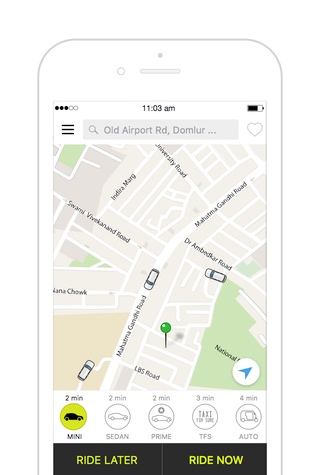
Did you know India has unicorns too? Of course you did.
Ola Cabs, the ride-hailing company giving Uber a run for its money in India, announced today that it has closed a $500 million Series F round led by Baillie Gifford with contributions from previous backers Falcon Edge Capital, Tiger Global, SoftBank Group, and DST Global. The new round values the company at $5 billion.
Also contributing to the round is Didi Kuaidi, the biggest ride-hailing threat to Uber in China, especially after new rules unveiled by the Chinese government appeared to favor locally-based services.
To date, Ola has raised over $1.3 billion in funding.
Uber, which has raised over $8 billion in funding, last secured nearly $1 billion at the end of July–around the time that Amit Jain, president of Uber India, said the company would be investing as much in India. But it has found a formidable competitor in China, India, and neighboring regions thanks to locally-based services and their big funding backers.
For example, Ola completes over one million bookings every day in India, whereas Uber does about a quarter of that figure. With today’s newly announced funding, Ola will be able to grow faster while investing in new markets and products. Today the company has about 350,000 vehicles operating on the platform–including regular taxis, premium taxis, rickshaws, and carpooling vehicles–across 102 cities.
A month ago, India’s Ministry of Transport issued guidelines opening the doors to Ola and Uber to operate in the country without being regulated as traditional taxi companies, as long as they took certain actions. For example, as has been increasingly typical across the world, the services must apply for permits from state transportation departments. Additionally, they will not be permitted to own or lease vehicles or represent themselves as a taxi service unless they also register as taxi operators.
While Ola is now valued at $5 billion and has been beating Uber in India, the latter company is still the most astonishing unicorn in the ride-hailing market since it commands a $50 billion valuation. Understandably, Uber has had to adopt unique strategies tailor-fitted to each new region it enters, a major challenge that itself warrants the large funding rounds it has raised.
The company now accepts cash as payment in several markets, including India (all cities), Kenya (Nairobi), Saudi Arabia (Jeddah and Riyadh), Vietnam (Hanoi and Ho Chi Minh City), and most recently Indonesia (Bandung) and the Philippines (Manila). This is a big step away from the way Uber (and its main competitor Lyft) operate in the United States, where both companies prohibit cash as a form of payment, in the name of convenience and to differentiate themselves from traditional cab companies.
In any case, it will be interesting to see how Uber fares in India now that its main rival, Ola Cabs, has bolstered its business with a large amount of capital.


















